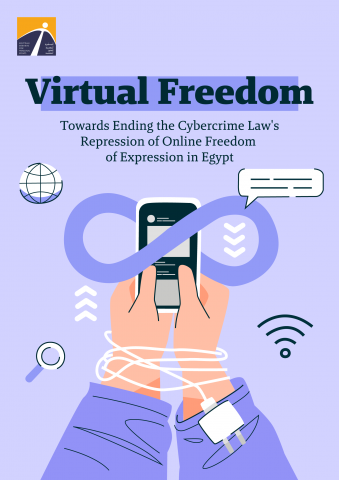Virtual Freedom: Towards Ending the Cybercrime Law's Repression of Online Freedom of Expression in Egypt
This study was prepared by Amr Abdel Rahman, director of EIPR’s Civil Liberties Unit. The desk research and data collection was carried out by EIPR’s researcher Mahmoud Nagy. Lobna Darwish, director of the Women's Rights and Gender Program, provided advice and comments on various drafts of this study. The final review and editing was made by Karim Ennarah, deputy executive director of research at EIPR.
Introduction:
Legislative, judicial, and security restrictions on digital expression have expanded in Egypt over the past dozen years. A range of previously legal acts have been criminalized, special penalties introduced, and existing penalties increased if crimes are committed online. The Anti-Terrorism Law No. 94 of 2015, the Press and Media Regulation Law No. 180 of 2018, and the Cybercrime Law No. 175 of 2018 are full of examples of this clampdown.
The Public Prosecution has introduced a new form of social media censorship by establishing an "electronic monitoring unit” to surveil such crimes in real time. It has also increased the number of charges it levels using crimes based on old, largely unutilized legislative articles, either from the Penal Code (such as articles 80 (d), 102 (bis), and 188 criminalizing various modes of spreading false news, and article 306 (bis a) criminalizing certain forms of defamation and slander) or the Telecommunications Regulation Law No. 10 of 2003 (especially article 76, which criminalizes “deliberately causing a nuisance using social media”).
In parallel with legislative and judicial developments, security practices have reflected a tendency to restrict various forms of expression if they find their way online, by both illegally blocking numerous websites and arresting citizens who have published content deemed by the security services to violate the Constitution and law.
As the scope of criminal acts has widened, the circle of those targeted by the security and judicial authorities has broadened prodigiously to include members of legally recognized political parties, those accused of terrorism or joining illegally established groups, journalists, media professionals, opinion writers, visual content creators, and users of private social media accounts who are not known for any activity in the public domain.
These restrictive trends emerged between 2013 and 2023, a decade that state institutions described as an "exceptional" time of protracted confrontation between the state and armed extremist groups, and widespread political mobilization of oppositional groups using the internet to reach people, in addition to incidents of sectarian violence. Towards the end of that decade official institutions signalled that the time had come to reconsider these restrictions because the exceptional circumstances had been overcome: the state of emergency was lifted in October 2021, for example, and national dialogue sessions started in 2023.
We disagree with the term “exceptional" for the circumstances surrounding the endorsement of these laws, and take issue with the idea that exceptionality justifies legislative and judicial arbitrariness, yet we believe that the state’s acknowledgement that dialogue is needed is a positive development that requires positive engagement.
Our constructive approach is to formulate a democratic normative framework to help legislators and judges define the limits of digital freedom of expression in general and to accurately determine the grounds, mechanisms, and controls for restricting it, without compromising the fundamental objective of the existing constitutional and legal framework: to protect and promote fundamental rights and freedoms, at the core being freedom of expression.
We are well aware that no normative framework, no matter how comprehensive , will resolve the inevitable recurrent disagreement between legislators and judges on the one hand and the public on the other over the limits of freedom of expression. We do not aim to resolve this dispute, but rather to provide a democratic framework for its management that will lift the public debate on the issue out of the spiral of authoritarianism, arbitrariness, fragmentation, and legalization of personal whims.




